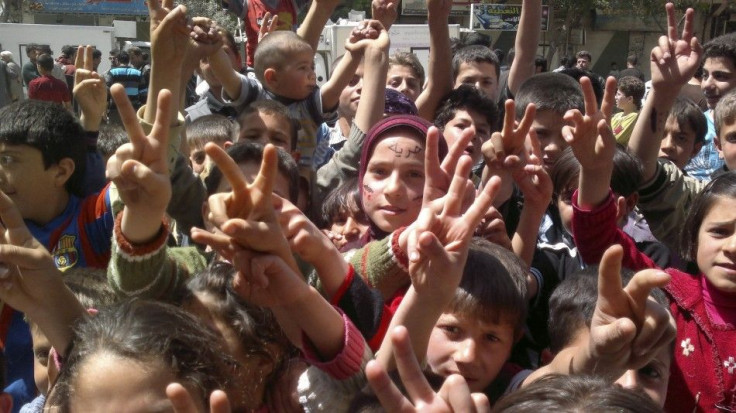International Pressure On Syria Mounts As Clinton Hints At Military Measures

World leaders sharpened their condemnations of the bloodshed in Syria on Thursday, with Secretary of State Hillary Clinton urging the United Nations to adopt a resolution similar to the one that enabled the NATO operation in Libya.
The Obama administration has resisted calls for a military solution to Syrian President Bashar al-Assad's brutal crackdown on dissidents, although the United States has decided to aid the Syrian rebels by sending them communications equipment.
But diplomatic solutions to the crisis continue to falter, first with China and Russia vetoing a Security Council resolution calling for Assad to cede power, and more recently with a ceasefire negotiated by special United Nations envoy Kofi Annan failing to stem the violence. World leaders on Thursday appeared frustrated with the lack of progress, and Clinton called for the United Nations to put in place tougher measures to pressure Assad.
I think we have to do more to take stronger action against the Assad regime, Clinton said. We need to start moving very urgently in the Security Council for a Chapter 7 sanctions resolution, including travel, financial sanctions, an arms embargo and the pressure that that will give us on the regime to push for compliance with Kofi Annan's six-point plan.
Clinton's invocation of Chapter 7 was significant because the same mechanism allowed NATO forces to establish a no-fly zone over Libya. While Clinton didn't specifically mention military action, an American official told the New York Times that a turning point was approaching if the Annan plan fails.
Top military officials also drew parallels to Libya on Thursday. Testifying before Congress, Defense Secretary Leon Panetta acknowledged that the Libya intervention was informing how officials are weighing their options in Syria. Panetta didn't discount the possibility of an escalation, saying that the United States must keep all options on the table, but he warned against the risks and limits of military force.
A decision is that we will not have any boots on the ground and that we will not act unilaterally in that part of the world, Panetta said in testimony to the House Armed Services Committee, adding that the only way that the United States would get involved militarily is if there's a consensus in the international community to try to do something along those lines.
Forging that consensus around a Chapter 7 resolution could prove difficult. China and Russia abstained from the resolution sanctioning action in Libya, and Russian Prime Minister Vladimir Putin was infuriated when the mission there turned from the alleged goal of protecting civilians to helping oust Ghadafi.
Russia made similar arguments about infringing Syria's sovereignty in vetoing the Security Council resolution calling for Assad to step down, and the possibility of another set of vetoes by Russia and China looms. Russia has continued to push back against calls for tougher measures against Assad, suggesting that the international community shouldn't be trying to force the Syrian president out of power.
There are outside forces that are not interested in the success of the current U.N. Security Council efforts, Foreign Minister Sergey Lavrov told reporters on Tuesday in reference to plan to send more monitors to Syria, adding that other countries are trying with everything possible to influence the Syrian opposition so that it doesn't work with the government in maintaining a cease-fire and setting up future dialogue.
A small contingent of U.S. senators, led by Arizona Republican John McCain, have for weeks been calling for an enlarged U.S. role in Syria that includes supporting the rebels with air strikes. Administration officials have so far rejected those calls, and the majority of lawmakers appear deeply reluctant to advocate a military solution.
© Copyright IBTimes 2024. All rights reserved.




















